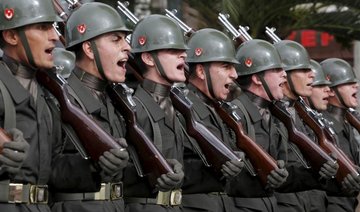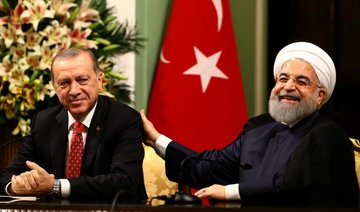GOSLAR, Germany: German Foreign Minister Sigmar Gabriel and his Turkish counterpart Mevlut Cavusoglu vowed Saturday to try to mend ties blighted by a slew of disputes.
Relations between the NATO partners have been badly strained in recent years.
“We have both given ourselves the task to do everything to overcome the difficulties in German-Turkish relations,” said Gabriel, who hosted Cavusoglu at his home in Goslar.
He said they had “open talks held in mutual respect” although they “certainly did not share the same view on all matters.”
Cavusoglu, however, warned against Turkey being lectured or threatened, saying: “These are not good methods, according to us.”
He also called for deeper economic ties based on “dialogue, mutual understanding and cooperation.”
Their talks followed a meeting in Paris on Friday between Turkish President Recep Tayyip Erdogan and French counterpart Emmanuel Macron, who warned that there was no chance of Ankara’s EU stalled membership bid moving forward.
Germany, home to a three-million-strong ethnic Turkish community, last year advised investors and holiday-makers to avoid Turkey and urged a cut in EU funding linked to Ankara’s membership talks.
The crisis has been fueled by other disputes: Over a German TV comic harshly lampooning Erdogan, a 2016 German parliamentary resolution on the Armenian genocide, and Turkey denying military base visits to German MPs.
Ankara has accused Berlin of failing to pursue followers of US-based preacher Fethullah Gulen, whom it blames for the 2016 coup attempt, and of failing to crack down on Kurdish militants.
Last year, when Germany repeatedly denied Turkish politicians’ requests to campaign for votes among the Turkish-German community, Ankara accused the government of using “Nazi” methods.
Erdogan had declared last month that Turkey “must reduce the number of enemies and increase the number of friends.”
The main hurdle in Ankara-Berlin ties is the detention of Die Welt daily’s German-Turkish correspondent Deniz Yucel on terror charges since last February, and of another six Germans Berlin says are jailed for “political reasons.”
Turkey has in recent weeks released several of the Germans whom Gabriel has labelled “hostages,” among them journalist Mesale Tolu.
Hopes grew that Yucel’s case too could be resolved after the Turkish government this week addressed it for the first time in 10 months with a submission to the constitutional court, which could soon rule on whether to release him from pre-trial detention.
Cavusoglu stressed the independence of Turkish courts but pledged that “we’re doing everything in our political power to speed up the judicial process.”
Gabriel recently suggested to news weekly Der Spiegel that Western countries should tone down lecturing Erdogan’s Turkey on democratic values because it could be counterproductive.
Calling for an “enlightened debate” on the issue, Gabriel said that “to constantly accuse each other of betraying values will neither get someone out of jail nor will it strengthen us.”
Top Turkish, German diplomats pledges to heal ties
Top Turkish, German diplomats pledges to heal ties

UPDATE 1-Putin clears out deputy defense ministers, appoints his relative

Putin sacked deputy defense ministers Nikolai Pankov, Ruslan Tsalikov, Tatiana Shevtsova and Pavel Popov, according to Kremlin decrees. He appointed Tsivileva, who Russian media said is the daughter of Putin’s cousin, as a deputy defense minister.
Leonid Gornin, a deputy finance minister, will be a first deputy defense minister under Defense Minister Andrei Belousov.
Pavel Fradkov, the son of former Prime Minister Mikhail Fradkov, was appointed a deputy defense minister. Oleg Savelyev was also appointed deputy defense minister.
After Putin last month appointed Belousov as defense minister and moved Sergei Shoigu to the Russian Security Council, the move appears to be an attempt to install loyalists in the defense ministry.
Low snow on the Himalayas threatens water security — study

- While snow levels fluctuate each year, scientists say climate change is driving erratic rainfall and shifting weather patterns
- Snow and ice crucial water source for around 240 million people in mountainous regions, 1.65 billion people in the river valleys below
KATMANDU: Millions of people dependent on Himalayan snowmelt for water face a “very serious” risk of shortages this year after one of the lowest rates of snowfall, scientists warned Monday.
Snowmelt is the source of about a quarter of the total water flow of 12 major river basins that originate high in the region, the report said.
“This is a wake-up call for researchers, policymakers, and downstream communities,” said report author Sher Muhammad, from the Nepal-based International Center for Integrated Mountain Development (ICIMOD).
“Lower accumulation of snow and fluctuating levels of snow pose a very serious increased risk of water shortages, particularly this year.”
Snow and ice on the Himalayas are a crucial water source for around 240 million people in the mountainous regions, as well as for another 1.65 billion people in the river valleys below, according to ICIMOD.
While snow levels fluctuate each year, scientists say climate change is driving erratic rainfall and shifting weather patterns.
The report measured “snow persistence” — the time snow remains on the ground — with levels dropping almost a fifth below normal this year across the wider Hindu Kush and Himalaya region.
“This year’s snow persistence (18.5 percent below normal) is the second-lowest in the past 22 years, narrowly trailing the record low of 19 percent set in 2018,” Muhammad told AFP.
As well as Nepal, the inter-governmental ICIMOD organization includes member countries Afghanistan, Bangladesh, Bhutan, China, India, Myanmar and Pakistan.
The report warned that ICIMOD “observations and projections indicate significant changes in the timing and intensity of stream flows,” with snow a key part.
“Snow plays a particularly important role in ensuring seasonal water availability,” it added.
The organization has been monitoring snow in the region for over two decades, noting that 2024 marked a “significant anomaly.”
The Ganges river basin, which flows through India, had the “lowest snow persistence” that ICIMOD has recorded, 17 percent below average, worse than the 15 percent in 2018.
The Helmand river basin in Afghanistan recorded its second-lowest snow persistence levels, 32 percent below normal.
The Indus river basin was down 23 percent below normal levels, while the Brahmaputra river basin, which ends in Bangladesh, had snow persistence “notably below normal” at 15 percent.
Miriam Jackson, senior cryosphere specialist at ICIMOD, urged authorities to “take proactive measures to address possible drought situations.”
Indian suspect in plot to kill Sikh separatist extradited to US

- Man accused over murder-for-hire plot extradited from Czech Republic
- Alleged plot targeted Sikh separatist resident in US, India denies involvement
WASHINGTON/PRAGUE: An Indian man suspected by the US of involvement in an unsuccessful plot to kill a Sikh separatist on American soil has been extradited to the United States from the Czech Republic, the Czech justice minister said on Monday.
Nikhil Gupta has been accused by US federal prosecutors of plotting with an Indian government official to kill Gurpatwant Singh Pannun, a US. resident who advocated for a sovereign Sikh state in northern India.
Gupta traveled to Prague from India last June and was arrested by Czech authorities. Last month, a Czech court rejected his petition to avoid being sent to the US, clearing the way for the Czech justice minister to extradite him.
“On the basis of my decision on (June 3), the Indian citizen Nikhil Gupta, who is suspected of conspiracy to commit murder-for-hire with intent to cause death, was extradited to the US on Friday (June 14) for criminal prosecution,” Czech Justice Minister Pavel Blazek said on social media platform X.
The comments confirmed an earlier Reuters story reporting on the extradition that cited the federal Bureau of Prisons website and a source familiar with the matter.
An inmate search by name on the Bureau of Prisons website showed on Sunday that Gupta, 52, was being held at the Metropolitan Detention Center, Brooklyn, a federal administrative detention facility.
A US Justice Department spokesperson declined to comment. Gupta’s US-based lawyer, attorney Jeffrey Chabrowe, had no immediate comment.
Over a dozen people were killed and tens injured after a freight train smashed into the back of a stationary passenger train in India’s West Bengal state on Monday,
DIPLOMATIC RELATIONS TESTED
The discovery of alleged assassination plots against Sikh separatists in the US and Canada has tested relations with India, seen by Western nations as a counter to China’s rising global influence. India’s government denies involvement in such plots.
Canada said in September its intelligence agencies were pursuing allegations linking India’s government to the murder of Sikh separatist leader Hardeep Singh Nijjar in June 2023 in Canada.
In November, US authorities said an Indian government official had directed the plot in the attempted murder of Pannun, who is a US and Canadian citizen. Gupta is accused of involvement in that plot.
Pannun told Reuters on Sunday that while the extradition was a welcome step, “Nikhil Gupta is just a foot soldier.” He alleged that those who hired Gupta were senior members of the Indian government who act on the direction of Prime Minister Narendra Modi.
India’s government has dissociated itself from the plot against Pannun, saying it was against government policy. It has said it would formally investigate security concerns raised by Washington.
New Delhi has long complained about Sikh separatist groups outside India, viewing them as security threats. The groups have kept alive the movement for Khalistan, or the demand for an independent Sikh state to be carved out of India.
Last month, Washington said it was satisfied so far with India’s moves to ensure accountability in the alleged plots, but added that many steps still needed to be taken.
Train crash in eastern India kills 15, injures dozens

- Accident blamed on freight driver disregarding signal
- Incident reflects government negligence, opposition leader says
KOLKATA: A freight train smashed into the rear of a stationary passenger train in India’s West Bengal state on Monday, killing at least 15 people and injuring dozens, police said, in an accident that railway authorities blamed on driver error.
Media showed images of the pile-up, with containers from the goods train strewn nearby, and one carriage left nearly vertical after the accident, which comes just over a year after a signalling error caused one of India’s worst rail crashes.
Fifteen bodies were pulled from the mangled carriages, Abhishek Roy, a senior police official in the eastern state’s district of Darjeeling, the site of the accident, told Reuters.
Fifty-four people were injured and rescue teams from the police and national disaster response force were working to clear debris from the derailed carriages, Roy added.
The goods train hit the Kanchanjunga Express traveling to Kolkata, the capital of West Bengal, from the northeastern state of Tripura, driving three carriages of the passenger train off the rails.
It was not immediately clear how many passengers were on board at the time.
Rescuers used iron rods and ropes to work free one carriage of the passenger train that had been swept upwards to lodge on the roof of the freight train by the impact of the collision.
The dead included the driver of the freight train and a guard on the passenger train, Jaya Varma Sinha, the head of the railway board that runs the countrywide network, told reporters.
The accident happened after the driver of the freight train disregarded a signal, Sinha added.
Rescue work has been completed, Sinha said, and authorities are working to restore traffic, with the damage less extensive than initially feared.
“The guard’s compartment in the passenger train was badly damaged,” she added. “There were two parcel vans attached ahead of it which reduced the extent of damage to passengers.”
Nearby residents heard a loud crash and saw the pile-up upon going to investigate, several told the ANI news agency, in which Reuters has a minority stake.
Prime Minister Narendra Modi offered condolences on the loss of life and said Railway Minister Ashwini Vaishnaw was on his way to the site.
About 288 people died a year ago in the neighboring state of Odisha, in India’s worst rail crash in more than two decades, caused by a signal failure.\
Opposition parties criticized Modi’s government for its record on rail safety.
“The increase in railway accidents in the last 10 years is a direct result of the mismanagement and negligence of the Modi government, which results in loss of lives and property of passengers on a daily basis,” Modi’s main opponent and Congress party leader Rahul Gandhi said in a post on X.
Nigel Farage promises tighter UK borders and tax cuts in election ‘contract’

- Immigration control receives top billing in policy plan
- Reform seeks to tempt voters away from Sunak’s Conservatives
MERTHYR TYDFIL, Wales: Nigel Farage, whose entry into the election has damaged Prime Minister Rishi Sunak’s faint hopes of victory, set out his policy plans on Monday, describing them as the first step to becoming the dominant party on the right of British politics.
On Monday he said the earlier-than-expected election had come too soon for his Reform UK party but called on supporters of Sunak’s Conservatives to “join the revolt” and pitched Reform as the only ones who could hold to account Labour, whose leader Keir Starmer is forecast to become the next prime minister.
Farage is one of Britain’s most recognizable and divisive politicians and has pressured successive governments into more aggressive stances on cutting immigration. He played a pivotal role in the 2016 vote to leave the European Union.
But his career has been spent campaigning from the sidelines of British politics, having stood unsuccessfully for a seat in parliament seven times and led parties which, despite attracting millions of votes, have failed to weaken the grip of Britain’s two main parties — the Conservatives and Labour.
This time Farage is standing in Clacton-on-Sea, southeast England, where polling shows he could win a place in parliament, but under Britain’s electoral system Reform is only expected to win, at most, a handful of seats across the country.
“We are not pretending that we are going to win this general election,” Farage said at the launch of a 24-page policy document, which he described as a “contract” with voters for the next five years.
But he added: “Our aim and our ambition is to establish a bridgehead in parliament and to become a real opposition to a Labour government.”
Reform chose Merthyr Tydfil for its launch to highlight what it says is Labour misrule in Wales.
Farage’s unexpected entry into the election race — having initially said he would not run and wanted to concentrate on campaigning for Donald Trump in the United States — has split support among Britain’s right-of-center voters.
The Labour Party is around 20 percentage points ahead in opinion polls and forecast to win a large majority. Reform overtook the Conservatives in one poll last week, and Farage has set a target of winning six million votes at the July 4 election.
Other polls put them far behind the governing party.
“JOIN THE REVOLT“
The Reform campaign has so far focused on Farage and his populist appeal.
The 60-year-old received an expensive private education and worked as a commodities trader but has successfully styled himself as a man of the people taking on an out-of-touch political establishment.
Reform’s policies are designed to appeal to the right of center voters who would typically back Sunak’s Conservatives, and they demand change across all the main policy areas.
Immigration, the issue on which Farage has for more than a decade struck a chord with voters, received top billing.
Reform promised to immediately freeze “non-essential” immigration, leave the European Convention on Human Rights, and push migrants arriving by small boats back to France before they land on British shores. They also proposed an extra payroll tax on companies who employ foreign workers.
That tax was one of a raft of measures, including shaving 15 billion pounds off the benefits bill, to raise money that would be spent on tax cuts elsewhere, including raising the income tax threshold to 20,000 pounds, slashing fuel duty by 20 pence per liter and getting rid of value added tax on energy bills.
“This is not a protest document, this is not a protest vote,” Farage said. “We’re unashamedly radical, we want change, this isn’t working.”














